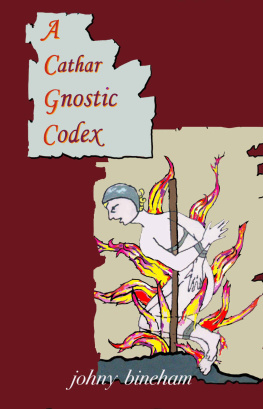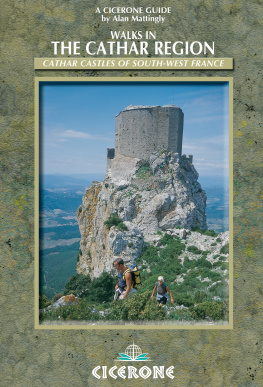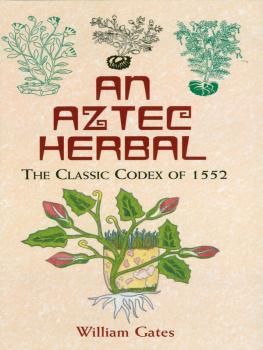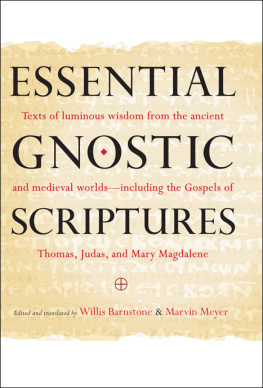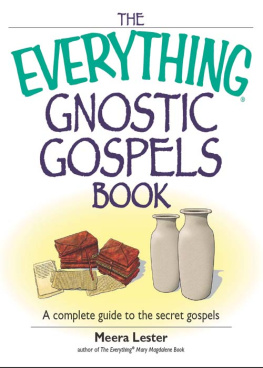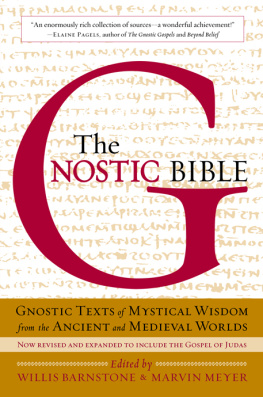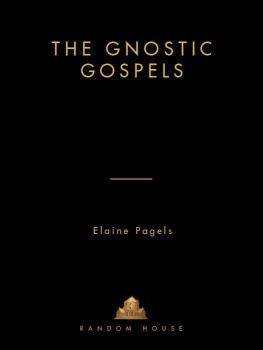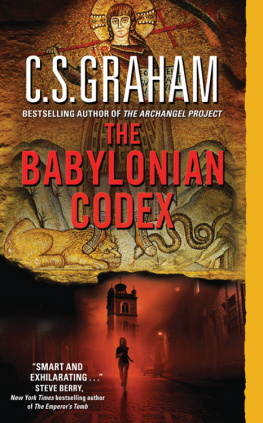Johny Bineham - A Cathar Gnostic Codex
Here you can read online Johny Bineham - A Cathar Gnostic Codex full text of the book (entire story) in english for free. Download pdf and epub, get meaning, cover and reviews about this ebook. year: 2014, publisher: Johny Bineham, genre: Religion. Description of the work, (preface) as well as reviews are available. Best literature library LitArk.com created for fans of good reading and offers a wide selection of genres:
Romance novel
Science fiction
Adventure
Detective
Science
History
Home and family
Prose
Art
Politics
Computer
Non-fiction
Religion
Business
Children
Humor
Choose a favorite category and find really read worthwhile books. Enjoy immersion in the world of imagination, feel the emotions of the characters or learn something new for yourself, make an fascinating discovery.
- Book:A Cathar Gnostic Codex
- Author:
- Publisher:Johny Bineham
- Genre:
- Year:2014
- Rating:3 / 5
- Favourites:Add to favourites
- Your mark:
- 60
- 1
- 2
- 3
- 4
- 5
A Cathar Gnostic Codex: summary, description and annotation
We offer to read an annotation, description, summary or preface (depends on what the author of the book "A Cathar Gnostic Codex" wrote himself). If you haven't found the necessary information about the book — write in the comments, we will try to find it.
A Cathar Gnostic Codex — read online for free the complete book (whole text) full work
Below is the text of the book, divided by pages. System saving the place of the last page read, allows you to conveniently read the book "A Cathar Gnostic Codex" online for free, without having to search again every time where you left off. Put a bookmark, and you can go to the page where you finished reading at any time.
Font size:
Interval:
Bookmark:
A
Cathar
Gnostic
Codex
A
CATHAR
GNOSTIC
CODEX
By
Johny Bineham
Copyright Johny Bineham, 2009
This book is in copyright. Subject to statuary exceptions and to
the provisions of relevant collective licensing agreements.
No reproduction may take place without the written agreement of
Johny Bineham.
Johny Bineham, Sydney, NSW, Australia.
ISBN-13: 978-1496006349
First published 2009
Contents
.Preface
.Introduction
.Aspects of Catharism
.The Rise, Fall and Survival of Catharism.
.A Cathar Codex
.Addendum A Affirmations
.Addendum B Hesychasm
.Addendum C Cathar Symbols
,Addendum D Glossary
and Recommended Books
A
CATHAR
GNOSTIC
CODEX
By
Johny Bineham
Dedicated
to Monica
for her
unwavering
support.
Please Note.
The Cathars were completely impervious to
doctrine and dogma of any kind, for they were evolving as a belief and intended to continue to evolve as further spiritual and mystical knowledge
became available to them.
The Cathar Dialogues and A Cathar Gnostic
Codex , though books in their own right, are in
effect, one book divided into two for
convenience sake.
The Cathar Dialogues relate the total experience,
whereas A Cathar Codex is designed
as a reference, as a summation
of The Cathar Dialogues .
Introduction
As Henri de Nebours put it: How to describe the indescribable. This Codex, or Manuscript, is not meant to refine the entire precepts of Catharism. Its aim, rather, i s to set down some of the salient points culled from the book, The Cathar Dialogues, which contain much of the conversations between Henri de Nebours and Guillaume de Mirepoix; both now departed to regions of the world of spirit.
At the time of the dialogues between Henri and Guil laume, which occurred over a period of seven years from 2000 until 2007, Guillaume was alive but not well; Henri was well but not alive; while I, Matheus, at the time of writing this book, am both alive and well.
The primary purpose for this Codex is to assist those i t is destined for. For others, it may be regarded as heresy or rubbish; whilst who knows what for the re mainder.
The Cathar perfected teachers worked on the prin ciple that the more knowledge you acquired, under stood and realized, the more you were taught. On this ba sis, some could consider this Codex an introduction to the philosophy of Gnostic Catharism.
The Codex is not meant for the exultation, nor denunciation of any belief, nor disagreement with another. Rather, it is set out to give a partial explanation into some of the deeper mystical aspects of Cathar Gnos tic philosophy, as understood by the advanced edu cated Perfecti . The Perfecti were the Cathar male and female clergy. What is expressed herein was unknown to the Credente , the Cathar lay followers, as well as partially educated Perfecti .
Another reason for this Codex is to dispel the view by some, that Catharism is a pessimistic philosophy. A religion of pessimism, for, They held out no hope for individual men and their salvation. so stated Stephen Runciman in his The Medieval Manichee. True! The Cathars were not in the least interested in salvation (or damnation) of the soul.
They held out for better things. They sought, they yearned desperately for, the reunion of their Divine Spark (our unchanging individuality, our very essence, as apart and distinct from our soul) with The Source. Birth, death, heaven (the world of spirit), rebirth, etc., etc., until, eventually, all will be reunited with The Source. To me - no salvation, no damnation, but eventual joy for all - equals - no pessimism.
Sexual pessimism is a phrase arrived at from no sex unless for reproduction, but this was not a Cathar belief; they held that sex was a natural act. However, this belief still echoes stri dently within the Church; although they have at last admitted to its enjoyment - but only as a reward for married couples. Certainly, some earlier Gnostic sects stated pessimistically regards the sex act: Whats the point of bringing into the world another soul to be entrapped in a material world? Better not to have sex at all.
However, just as all Christian religions werent the same, Gnostic sects also had their differences. Beliefs tend to evolve and change even when the funda mentals remain essentially the same.
With the Cathars, though their clergy were celibate (only donning the cloth, after a normal lifeti me of sex, family and children). Also vegetarian, the clergy were noted for their long and many fasts so obes ity wasnt a problem. The lifestyle restrictions of the Perfecti came about because they were out to fast track ( to perfect) their spiritual lives so that their Divine Spark could reunite with The Source. However, their lay followers the Credente , were taught that, The body is always innocent. That the natural functions of the body were indeed natural, which included sex not being sinful of itself.
Please consider this Codex, merely an insight into Gnostic Catharism, while realizing that the roots of this Gnostic knowledge have far more ancient origins than either Christianity, Islam or Judaism. More importantly, this Codex is not meant as a new form of doctrinal teaching. This essential viewpoint is best expressed by some quotes from the parfait , Henri de Nebours:
I wish I could convey to you the complete indifference of the Cathars to doctrine.
Remember too that the Cathars did not seek to found a religion.
The interesting thing about true Gnosticism is that it is incapable of being made into a religion. Because the teaching is so high and remote from everyday re ality, it appeals only to certain advanced souls.
Please, make or take from the Codex whatever you find to be of benefit.
Matheus
Johny Bineham
Aspects of Catharism
A long habit of not thinking a thing wrong,
gives it the appearance of being right.
Thomas Paine
Was Catharism a Christian religion? One could say that it was, and it wasnt. Medieval Cathars believed they were virtually unchanged from the first primitive Christians. It was the Church which had changed. A reasonably unbiased review of Christian history must back the Cathar assertion.
Gnostic Christianity placed all knowledge, including self-knowledge, above faith. It was the Christian Gnostics view that Christ brought salvation, not from sin, but from ignorance.
The Cathars wanted all of Christianity, to return to the essence of Christs teaching which was universal love for all, including animals and plants. They rejected the established Catholic Church for having turned away from the essential loving core within Christianity to its vast material power, richness, pomp, ceremony and corruption.
So Catharism was certainly rooted in a Gnostic Christian religious tradition but the belief structure behind it was gradually evolving into an ageless Universalism. Medi eval Christian Catharism was elevated to pure Gnos ticism which transcends the restrictions of religion. True Gnosticism is too high, too questioning and too remote, to be held within the dogmatic confines of the collective beliefs of any particular religion.
Consider this situation, if you were born around 1000 AD, at the advent of Medieval Catharism in Europe, almost the en tire European world was Christian as well as being Catholic. This includes most Cathars, who were virtually all born in to the Catholic faith before they made the transition to Catharism. Much the same, as all the first Christians were Jews (including Christ, who was born a Jew and died a Jew) before some made the transition to Pauls primitive embryonic Hellenized Christianity.
Font size:
Interval:
Bookmark:
Similar books «A Cathar Gnostic Codex»
Look at similar books to A Cathar Gnostic Codex. We have selected literature similar in name and meaning in the hope of providing readers with more options to find new, interesting, not yet read works.
Discussion, reviews of the book A Cathar Gnostic Codex and just readers' own opinions. Leave your comments, write what you think about the work, its meaning or the main characters. Specify what exactly you liked and what you didn't like, and why you think so.

